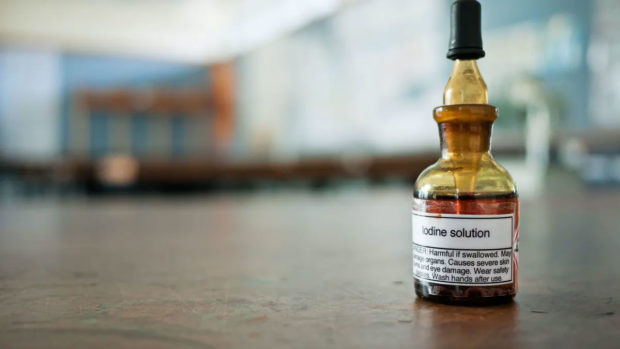
Gargling with iodine won’t stop you getting COVID
Team Udayavani, Sep 24, 2021, 10:04 AM IST

Credit: Alamy Stock Photo
East Anglia: Social media is awash with bogus COVID treatments. First, there was hydroxychloroquine, then bleach, followed hard on the heels by ivermectin – a cattle dewormer. The latest on the scene is povidone-iodine, an antiseptic.
Some people have claimed on social media that gargling with iodine can prevent the spread and severity of a COVID infection, suggesting it as an alternative to getting the vaccine.
Iodine has been used as an antiseptic for almost two centuries, with povidone-iodine being a commonly used modern preparation. Laboratory studies have shown that it is effective against coronavirus, inactivating it in as little as 15 seconds. This caused the researchers who made the discovery to suggest that using povidone-iodine in the nose and mouth could help to reduce the person-to-person spread of coronavirus and limit the severity of the disease in those infected. This presumes that what happens in the test tube will also happen in humans, which is a significant leap of faith.
The idea of halting infection in the mouth has been around for a while. Until the 1970s, the makers of Listerine mouthwash claimed that using it regularly could prevent colds and sore throats, until they were obliged to remove this claim because of lack of evidence. Trials since then that have looked at gargling to reduce colds and flu have shown conflicting results, with little evidence of any worthwhile benefit. In Japan, daily gargling for hygienic reasons has been a common cultural practice for centuries, using everything from water, to tea, to antiseptics.
During a press conference in August 2020, the state governor of Osaka prefecture, responding to a very small research study, suggested that gargling with povidone-iodine would help prevent COVID. When questioned about the strength of the scientific evidence, he side-stepped the question, replying: “It’s worth giving a try.” Similar advice – based on a hunch – has been offered by oral-health experts in the UK. A recent review of the evidence attempted to answer the question: does povidone-iodine reduce the transmission of COVID? Much of this research turned out to be laboratory studies, with relatively few trials carried out on patients.
While these patient-based studies suggest that povidone-iodine can inactivate coronavirus in the mouth for a period of time – an unsurprising finding – there is not a single study to date that shows it will stop the transmission of coronavirus or reduce the severity of the disease in those already infected. Using a simple analogy, cleaning down a work surface with antiseptic wipes will only ever provide temporary disinfection.
Questionable argument The “worth giving a try” argument is questionable. From a practical point of view, povidone-iodine is difficult for many patients to use in the mouth and nose as it tastes and smells disgusting. While side-effects of povidone-iodine are mostly tolerable, irritation of the skin is common and sometimes severe. More rarely, but more seriously, povidone-iodine can cause an underactive thyroid gland, particularly in pregnant women.
The makers of povidone-iodine are clear in advising people that their products are not designed for gargling or putting in the nose to prevent COVID.
Aside from the immediate risks of using povidone-iodine inside the body, is the harmful effect of promoting treatments for a pandemic that are not based on reliable evidence, particularly when there are measurably effective alternatives. Gargling with iodine won’t stop you from getting COVID, but it may distract you from something that will: vaccines.
By Roger Tisi, Associate Professor, Head of Undergraduate Medicine, School of Medicine, Anglia Ruskin University
The Conversation
Udayavani is now on Telegram. Click here to join our channel and stay updated with the latest news.
Top News

Related Articles More

High nitrate levels in groundwater threaten public health in 440 districts: Report

Gujarat IMA opposes ‘mixopathy’ proposal; says it poses ‘severe risks’ to people’s health

Study links social inequality to dementia-related changes in brain
People single all their lives might have low life satisfaction: Study

Drinking tea, coffee linked to lower risk of head and neck cancer: Study
MUST WATCH
Latest Additions

Minister Jarkiholi hosts dinner for Karnataka CM, cabinet colleagues giving rise to speculations

Rohit’s road ahead: Tough to see ‘Hitman’ in India jersey beyond Champions Trophy

Caste discrimination in colleges sensitive issue, will do something to stop it: SC

Gangolli: Protest against namaz in panchayat office

LPG tanker overturns on Coimbatore flyover in TN, officials avert major tragedy
Thanks for visiting Udayavani
You seem to have an Ad Blocker on.
To continue reading, please turn it off or whitelist Udayavani.




















